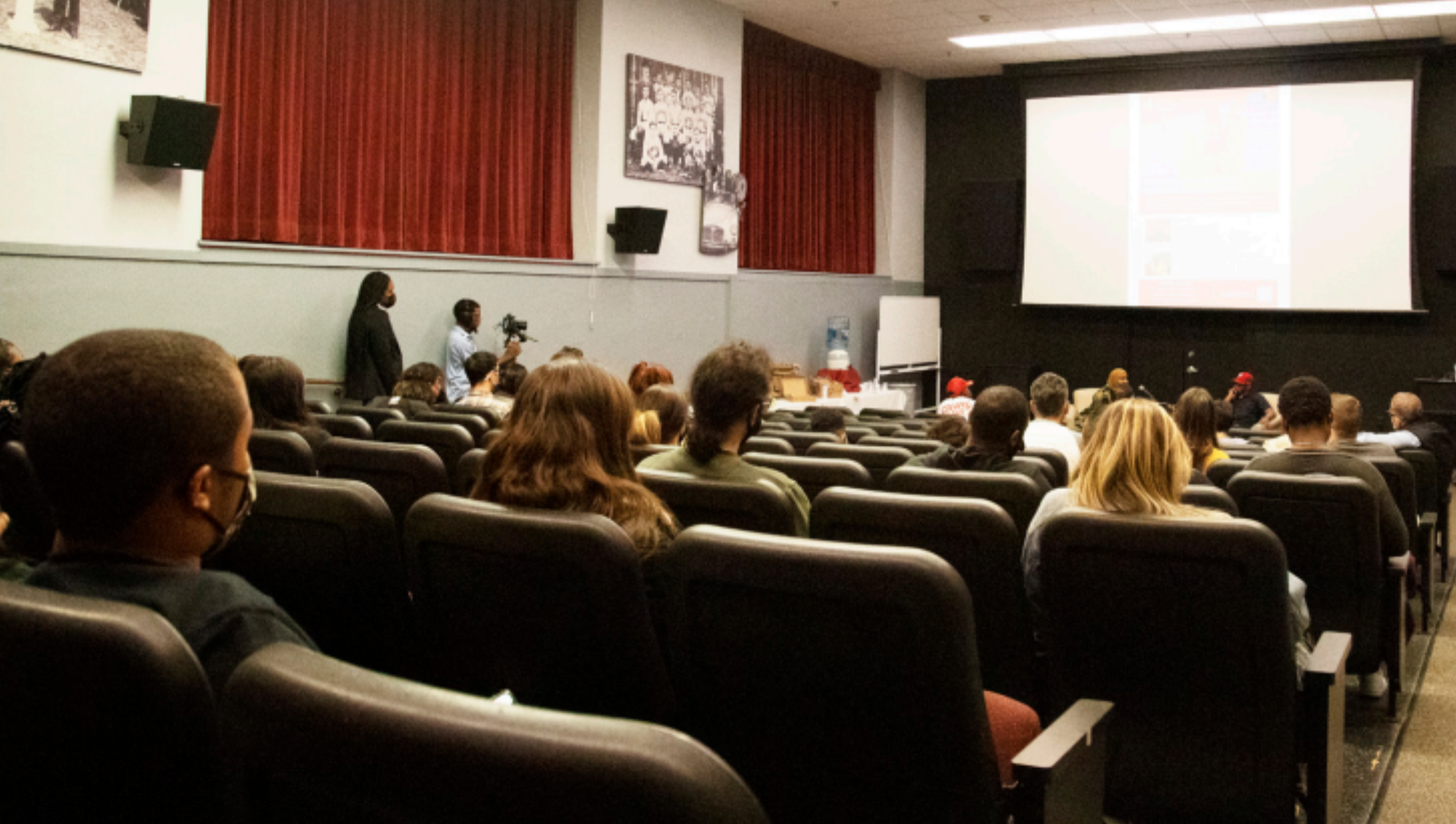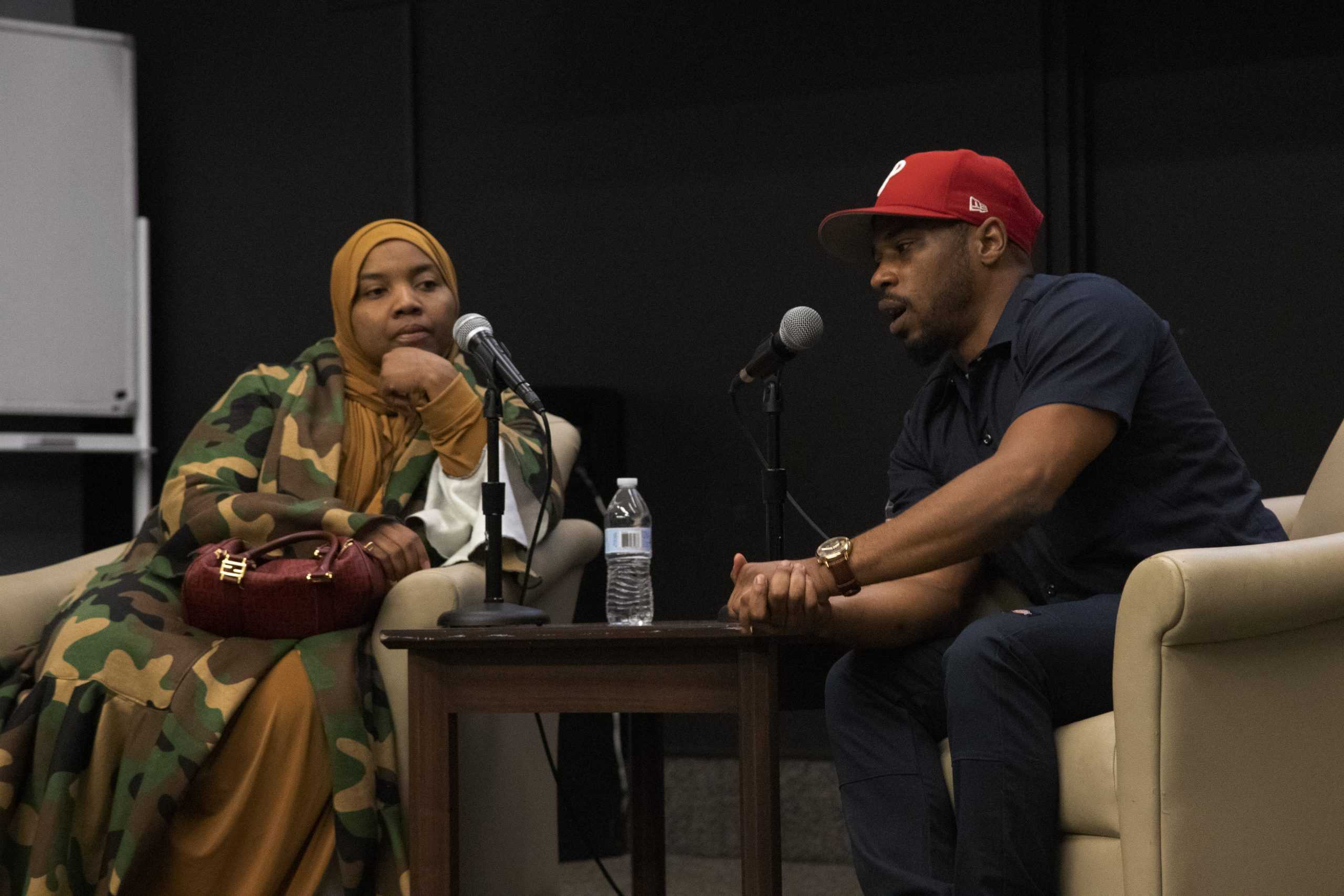Shuja Moore and Sydia Bagley spoke to the St. Joe’s community about trauma and post-prison rehabilitation following a screening of “Healed People, Heal People,” the third episode of “Walkies,” a digital series telling the stories of people who have found success after being incarcerated.
The event, entitled “Reentry and Redemption: ‘Walkies’ Films Screening and Q&A,” was held on Nov. 9 at the Forum Theatre in Campion Student Center.
Moore, the creator and executive producer of “Walkies,” started the series to highlight the voices of those who have previously been incarcerated and to help those that may be at risk. After being incarcerated for 12 years, Moore returned to West Philadelphia upon release to support the community by providing economic advice and support.
Moore and the “Walkies” team host nation-wide screenings of the series, both virtually and in-person. “In our criminal and legal system—and I’m being intentional without saying justice system because I haven’t experienced justice from going through that—it’s set up to make it very easy to enter and very hard to exit,” Moore said during the event. “Once you are released, there’s nothing but barriers.”
The event was sponsored by the Center for Inclusion and Diversity (CID), the Beautiful Social Research Collaborative and the Pedro Arrupé Center for Business. Down North Pizza, a business that hires those who have previously been incarcerated, catered the event.
The event’s main coordinator was Imani Briscoe ’17, program specialist for Inclusion and Diversity Experiential Programming (IDEP). Briscoe met Moore through a personal contact and wanted to bring Moore’s “Walkies” series to St. Joe’s to show the intersection of incarceration and trauma and to give space for this conversation on campus.
“We’re able to see that they paid more than enough time,” Briscoe said. “[We are] making sure that they are given that second chance and an equitable space.”

Nicole R. Stokes, Ph.D., associate provost of Diversity, Equity and Inclusion, said the event prompted an important discussion of second chances and rehabilitation for people who were previously incarcerated.
“Our system, often in many cases, is set up for people to have made earlier mistakes or have paid for their mistakes and not always be able to redeem, resume their lives and have economic independence going into the job market specifically,” Stokes said. “There is a clear correlation between someone finding a job upon reentry and not repeating crime again.”
In “Healed People, Heal People,” Moore discusses with Bagley her story of being in prison and finding herself during her struggles with returning to her life and family.
Bagley, after serving in prison, began to cope with a past sexual assault and started a successful catering company and “Locked Down Love,” an annual event hosted to celebrate ex-offenders reintegrating into society and overcoming adversity and stigma.
“It’s therapeutic for me. It makes me relive everything. I went through a note and I’m on the right track. I’m doing what I’m supposed to do,” Bagley said during the event. “It just makes me want to do even more than what I’m doing. That’s why I decided to turn “Locked Down Love” into a nonprofit organization. Just looking at this film always reminds me that there’s so much more to be done.”
Deanna Smith ’22, a criminal justice major, attended the event for her sociology course, Gender, Crime and Criminal Justice. Smith said hearing the individual experiences of Moore and Bagley was different from learning about incarceration in classes.
“In our classes, we usually learn about the system as a whole and the characteristics of the people go through the system as a whole,” Smith said. “Learning about an individual’s story is really different because it really humanizes the process of what people go through.”
The third episode of “Walkies,” titled “Healed People, Heal People” is available on YouTube.













































